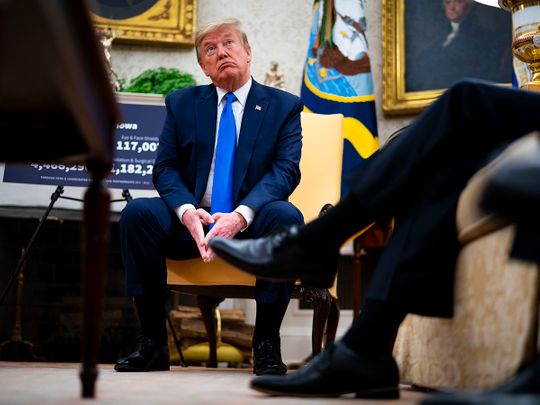
The US government’s top experts have warned that COVID-19 was by no means under control and that premature easing of social distancing could have disastrous consequences. As far as I can tell, their view is shared by almost all epidemiologists.
But they were shouting into the wind. Clearly, the Trump administration and its allies have already decided that we’re going to reopen the economy, never mind what the experts say. And if the experts are right and this leads to a new surge in deaths, the response won’t be to reconsider the policy, it will be to deny the facts.
Indeed, virus trutherism — insisting that COVID-19 deaths are greatly exaggerated and may reflect a vast medical conspiracy — is already widespread on the right. We can expect to see much more of it in the months ahead.
Thanks to the rally-around-the-flag effect, many world leaders saw their approval ratings soar as the seriousness of the COVID-19 crisis became apparent; Trump, who spent many weeks in denial, saw only a slight bump, which has now receded
At one level, this turn of events shouldn’t surprise us. The US right long ago rejected evidence-based policy in favour of policy-based evidence — denying facts that might get in the way of a predetermined agenda. Fourteen years have passed since Stephen Colbert famously quipped that “reality has a well-known liberal bias.”
At another level, however, the right’s determination to ignore the epidemiologists is reckless in a way previous denials of reality weren’t.
Right-wing strategy
As many people have pointed out, the emerging right-wing strategy for dealing with this pandemic — or, more accurately, not dealing with it — closely follows the Republican Party’s long-standing approach to climate change: It’s not happening, it’s a hoax perpetrated by liberal scientists, and besides, doing anything about it would destroy the economy.
Indeed, the anti-lockdown demonstrations of recent weeks appear to have been organised in part by the same people and groups that have spent decades denying climate change.
Virus trutherism is also reminiscent of the various kinds of trutherism that ran rampant during the Obama years. Inflation truthers insisted that the government was hiding the truth about rampant inflation; unemployment truthers, including Donald Trump, insisted that the steadily improving job numbers were fake.
But making false claims about the Obama-era economy didn’t come with any political price. Neither, sadly, has climate change denial: The consequences of that denial unfold too slowly for voters to focus on the immense damage it will do over time.
Virus denial, by contrast, could backfire badly on Republicans in a matter of months.
Rally-around-the-flag effect
In fact, in some ways that has already happened. Thanks to the rally-around-the-flag effect, many world leaders saw their approval ratings soar as the seriousness of the COVID-19 crisis became apparent; Trump, who spent many weeks in denial, saw only a slight bump, which has now receded.
Within the United States, governors who have taken tough measures to control the pandemic have been rewarded with very high approval, while those who minimised the threat and are pushing to reopen fare much worse.
Now, imagine the blowback — especially, by the way, among senior citizens — if an attempt to restart the economy leads to a new wave of infections.
So why are Trump and company going down this route?
One answer is that thousands of Americans may be about to die for the Dow. We know that Trump is obsessed with the stock market, and his long refusal to take COVID-19 seriously reportedly had a lot to do with his belief that doing otherwise would hurt stock prices. He may now believe that pretending that the crisis is over will boost stocks and that that’s all that matters.
Another answer is that Republicans may actually believe that the gun-waving, red-hatted anti-social distancing demonstrators represent the “real America.”
And there are indeed Americans who fly into a rage when asked to bear any inconvenience on behalf of the public good. Polls suggest that they’re a small minority, but the GOP may consider such polls fake news.
I’d like to suggest, however, that there may be yet another reason for the dangerous push to reopen the economy. Namely, Republicans in general and Trump in particular suffer from a deep sense of inadequacy.
When officials find themselves confronting an unexpected crisis, they’re supposed to roll up their sleeves and deal with it — bring in the experts, devise and implement an effective response. That’s how the Obama administration responded to Ebola back in 2014.
But the GOP doesn’t like experts, and it doesn’t have policy ideas beyond tax cuts and deregulation. So it doesn’t know how to respond to crises that don’t fit its usual agenda.
Trump, in particular, can do policy theatre — sending Jared Kushner out to make noises about dealing with problems — but has no idea how to do it for real.
And I think that at some level he knows that.
Given this sense of inadequacy, it was probably foreordained that Trump and his allies, after a brief period of seeming to take COVID-19 seriously, would pivot back to insisting that everything is fine.
And they may, for a while, even convince some voters. But the coronavirus, which doesn’t care about political spin, will have the last word.
— Paul Krugman is one of America’s foremost public intellectuals. He is a Nobel laureate and teaches economics at the City University of New York









